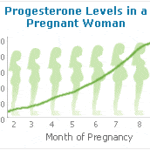
Pregnant women often complain about frequent heartburn symptoms during their gestation periods, and there can be several reasons why they experience it. So let’s discuss how to deal with acid reflux during pregnancy.
Related: Tackling Postpartum Hemorrhage Head-On
What is Acid Reflux during Pregnancy?
Due to hormonal changes and pressure from the expanding uterus, acid reflux is a typical symptom during pregnancy. Progesterone, a hormone, relaxes muscles while also relaxing the valve between the stomach and esophagus. Acid reflux symptoms are brought on by the painful passage of stomach acid back up into the esophagus as a result of this relaxation.
Do You Know? Acid reflux affects approximately 30-50% of pregnant women, making it a widespread condition.
What are the Symptoms of Acid Reflux during Pregnancy?
The main sign of acid reflux is heartburn, which feels like a burning sensation in the middle of the chest. It may also make you feel heavy or full in your chest or stomach.
You might be more likely to get heartburn:
- After eating a meal or drinking something
- When lying down
- When bending over
Heartburn can happen to anyone, but it’s especially common during pregnancy.
Other possible signs of acid reflux include:
- A bitter taste in your mouth
- A sore throat
- Coughing
- Feeling bloated
- Burping
- Feeling nauseous
- Vomiting
Related: 5 Nutritious Pregnancy Smoothie
What are the Reasons for Acid Reflux during Pregnancy?
Hormonal Changes
One of the reasons why this happens is the increased level of hormones in their bodies when they’re carrying a child. As hormonal levels rise up the charts, the ligaments that play their part in keeping the lower esophageal sphincter (LES) tightly closed, are softened. Due to this resting of LES at unsuitable periods, chances are that it will allow the food coupled with the gastric acid to make its way back to the esophagus and eventually to the throat as well.
Pressure on the Stomach
Another reason why women experience such heartburns is because the development of the baby causes changes in many structures of the mother’s body, one of them being that more pressure is created in the mother’s stomach. This, in turn, causes the contents of the stomach to be forced into the LES, and then make its way to the esophagus.
Dietary Habits
Certain foods and beverages, such as spicy or fatty foods, citrus fruits, chocolate, and caffeine, can trigger acid reflux symptoms.
Lifestyle Factors
Smoking, excessive weight gain, and stress can worsen acid reflux symptoms during pregnancy.
Related: Say Goodbye to Pregnancy Headaches
What are the Treatments to deal with Acid Reflux during Pregnancy?
Before taking any heartburn medication during pregnancy, it’s important for women to have a conversation with their doctor. A doctor can provide guidance on which medications are safe for both the woman and the developing fetus.
According to UT Southwestern Medical Center, there are three main types of heartburn medication that have been deemed safe for pregnant women to use. Let’s take a closer look at each of them:
- Oral antacids: These are medications that help neutralize stomach acid, reducing its acidity. Examples of oral antacids include aluminum and magnesium hydroxide (like Maalox and Mylanta) and calcium carbonate (such as TUMS). They can be obtained either over the counter or through a prescription.
- H2-receptor antagonists: These medications work by preventing the stomach cells from producing excessive acid. They achieve this by lowering the levels of a chemical called H2 histamine, which normally stimulates the production of stomach acid. Common examples of H2-receptor antagonists are cimetidine (Tagamet HB) and famotidine (Pepcid). These brands are available without a prescription.
- Proton pump inhibitors: Proton pump inhibitors (PPIs) work by blocking an enzyme necessary for the production of stomach acid. This effectively reduces acid levels. Examples of PPIs include lansoprazole (Prevacid) and omeprazole (Prilosec). It’s worth noting that PPIs may take a few days to work optimally. As a result, individuals might want to consider trying an antacid or H2-receptor antagonist first. PPIs can be obtained both over the counter and with a prescription.
Remember, it’s essential to consult with a healthcare provider to determine the most suitable and safe medication option for managing heartburn during pregnancy.
What are the Home Remedies to deal with Acid Reflux during Pregnancy?
This condition is not untreatable. There are many steps pregnant women can take and many guidelines that can be followed to eliminate the uneasiness caused by heartburns. The advices mentioned below are very effective in lessening the discomfort caused by heartburns. However, they might not completely eliminate it.
- Try not to eat foods that would make your heartburn worse. Avoid spicy foods, citrus fruits and their juices, chocolates, tomatoes and their products, fat-laden foods, fried foods, and dishes that come with extensive seasoning. You might want to visit a medical professional or a nutritionist so you get to know about the complete range of products that you should avoid during such a crucial stage of your life.
- Do some research and find out about beverages that contain caffeine, such as carbonated drinks, coffee, and tea. Kick them out of your dietary habits because too many of these will cause the softening of LES and lead to the acid coming back to the esophagus.
- Alcohol is one of those things you wouldn’t want to try at all during this phase. It has an effect similar to that of caffeine, thus creating a pathway that leads to heartburns.
- Divide your meals. Instead of consuming larger meals, take smaller meals frequently to keep your energy level from falling and LES from relaxing.
- Take time to chew your food properly, and do not take the next bite until the previous one has easily made its way into your esophagus. Take your time while eating and prevent potential heartburns.
- The time between your sleep and your last meal should be divided by at least three hours of rest.
- Increase your water intake to at least 8-10 glasses per day. Keep yourself hydrated throughout the day and not only during the mealtime, because it will give more pressure to the stomach, which will result in an inappropriate softening of LES, and that’s something you’d want to avoid at all costs. Therefore, consume more water and fluids in between meals rather than during meals.
- When you’re on your bed and trying to sleep, ensure that your head is elevated at a height of at least six to eight inches above the level of your mattress. Consider sleeping with elevated head and shoulders with the help of a wedge pillow. This will bring gravity into effect and it will keep your stomach’s acids from moving up your digestive system. Nighttime heartburns can be controlled even more effectively if your have a medical professional to guide you about it.
- Avoid clothes that fit tightly, because pressure around the waist will cause stomach acids to make their way up your esophagus, leading to yet another heartburn.
- Instead of bending at your waist, bend at your knees in order to avoid the development of excessive pressure in your stomach.
- Avoid slouching and sit erect in a comfortable chair.
- Ensure not to run overweight, because too much fatty content can develop excessive unwanted pressure on your stomach, forcing its contents upwards through the loosened LES. Seek professional assistance from a doctor.
- Smoking should be avoided at all costs, because in addition to triggering heartburns, it can also have negative effects on the pregnant woman as well as on her unborn child.
Related: What To Eat When Pregnant?
When to see a Doctor?
If pregnant women experience persistent or severe heartburn that doesn’t improve with over-the-counter remedies or home treatments, it’s crucial for them to seek medical attention. Sometimes, heartburn-like pains below the ribs can indicate a condition called preeclampsia. This serious condition, if left untreated without regular monitoring and necessary interventions, can pose a threat to the lives of both the woman and the fetus.
In addition to persistent heartburn, other indications of preeclampsia include:
- High blood pressure
- Swelling of the face, hands, and feet
- Intense headaches
- Vision problems
Attending all scheduled routine antenatal appointments is of utmost importance. This way, healthcare providers can identify and address any emerging health issues during the pregnancy, ensuring the best possible care for both the mother and the baby.
Conclusion
Expectant moms may face painful and upsetting symptoms of acid reflux during their pregnancies. They, however, can get deal with acid reflux during pregnancy by adopting a nutritious diet, maintaining good eating habits, making lifestyle changes, and taking into account natural therapies. It is essential to seek the individualized counsel and direction of healthcare specialists during pregnancy. Keep in mind that every pregnancy is different from the next, so what works for one woman may not work for another. Pregnant women can successfully control acid reflux and have a more pleasant pregnancy with the correct techniques and assistance.
In conclusion, it is feasible to control acid reflux during pregnancy by combining lifestyle modifications, dietary changes, natural therapies, and obtaining expert assistance when necessary. Pregnant women can greatly lessen acid reflux symptoms and pain by taking a proactive stance and applying the advice provided in this article. Always emphasize living a healthy lifestyle, pay attention to your body, and seek the advice of medical specialists for specific recommendations. Pregnant women may negotiate the acid reflux conundrum and concentrate on the happy times of pregnancy with the right care and attention.
Frequently Asked Questions (FAQs)
How common is Acid Reflux during Pregnancy?
Acid reflux is relatively common during pregnancy, affecting approximately 30% to 50% of pregnant women.
Can Acid Reflux harm the Baby?
Acid reflux does not directly harm the baby. However, it can cause discomfort and disrupt the mother’s sleep, leading to fatigue and other complications.
Are there any Specific Foods that can help alleviate Acid Reflux during Pregnancy?
While individual preferences may vary, some foods that are generally considered soothing for acid reflux include bananas, oatmeal, yogurt, and honey.
Can Stress worsen Acid Reflux Symptoms during Pregnancy?
Yes, stress can exacerbate acid reflux symptoms. Engaging in stress-reducing activities like yoga, meditation, or deep breathing exercises may help alleviate symptoms.
Is it Safe to take over-the-counter Antacids during Pregnancy?
Many over-the-counter antacids are considered safe for pregnant women. However, it’s always best to consult with a healthcare professional before taking any medication during pregnancy.
Will Acid Reflux disappear after Pregnancy?
In most cases, acid reflux symptoms improve or disappear after pregnancy, as hormone levels normalize, and the pressure on the stomach decreases












